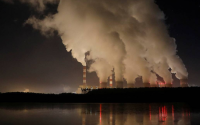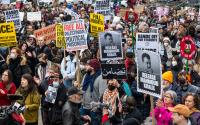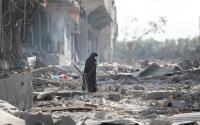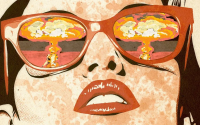23 November 2004
The operation on Tuesday came as world powers and Middle Eastern states meeting in Egypt threw their weight behind the war-torn country's first free and multi-party elections in decades.
US marines and an Iraqi Swat (special weapons and tactics) team swept through the small south-central Iraqi town of Jibla, starting a fresh campaign in the north of the Babil (Babylon) province, the US military said in a statement.
The offensive involved more than 5000 Iraqi, US and British forces and follows the seizure of Falluja, the statement said.
"As the Iraqi people prepare to vote in nationwide elections in January, multinational forces are determined to capture or kill those who desire to destabilise the elections process," the military said.
Joint operation
The joint operation resulted in the seizure of 32 suspected fighters, the military said. Jibla is 80km south of Baghdad and in what is known as the Triangle of Death.
The military said US and Iraqi forces continued rounding up suspected fighters in house-to-house searches and vehicle checkpoints.
In the past three weeks, Iraqi troops and US marines have detained nearly 250 suspects, the statement added.
 |
US-led forces conducted house to house searches |
They have been aided by British forces from the 1st Battalion of the Black Watch Regiment, which was brought into the area from southern Basra to aid American forces in closing off escape routes for fighters between Baghdad, Babil province to the south and Anbar province to the west.
It would be the third major military offensive against fighters opposed to the US-led government since the massive Falluja operation, which has claimed the lives of more than 50 US soldiers and injured more than 400.
Close to the northern city of Kirkuk, US and Iraqi forces on Tuesday rounded up dozens of suspected fighters in a pre-dawn raid and seized automatic weapons, ammunition and communications equipment, the US military said.
Detention
Kirkuk's local government on Tuesday also publicised the capture in recent days of five leading fighters including the brother-in-law of former president Saddam Hussein's chief deputy, Izzat Ibrahim al-Duri.
The governor's office said Umar Ali al-Sufyan, also known as Abu Sufyan, was arrested by US forces on 28 October.
He is suspected of sponsoring anti-US attacks.
Children killed
On Tuesday, two Iraqi children were killed when mortar bombs landed on houses near a US military base in al-Muallimin neighbourhood in central Samarra city, medical sources told Aljazeera.
 |
Izzat Ibrahim al-Duri's brother-in-law was arrested in Kirkuk |
A number of soldiers were injured and their Hummvee was destroyed when an explosive device detonated on the outskirts of Samarra.
In a separate incident, two fighters were killed and a third injured when an explosive device they were attempting to plant, detonated in al-Jubairiya district southeast of Samarra city.
Another fighter was killed when an explosive device detonated as he was attempting to plant it on a road in Baiji, northeast of Baghdad, Aljazeera reported.
Meanwhile, the Pentagon has announced the deaths of five more US marines near Falluja, where US-led forces are winding down a major assault on the city.
A US soldier was also killed in northern Iraq, although details of the deaths have not yet been released.
The latest casualties bring the US troop toll to more than 1221 since the March 2003 invasion.
Falluja refugees
Meanwhile, many refugees who left Falluja are living in poor conditions with inadequate shelter and food in areas surrounding the besieged city.
Shaikh Yunus al-Hamdani, a member of the Iraqi Relief Body from Saqlawiya told Aljazeera the relief process was difficult as electricity had been disconnected for 15 days.
"Water supply stations which depend on electricity do not work so water has been cut for 15 days.
"Medical aid has not reached us and I confirm that we have not received any aid from the Iraqi government which said it would send relief. People have nothing to protect them from the freezing weather.
"I call on non-governmental organisations to take the initiative to aid the people of Falluja in Saqlawiya who face very critical conditions", he said.
It is estimated there are about 15,000 families who fled Falluja and are now living in makeshift shelters outside the city.
http://english.aljazeera.net/NR/exeres/3519CAA9-46D7-473E-BA2E-CA49785E5D41.htm






